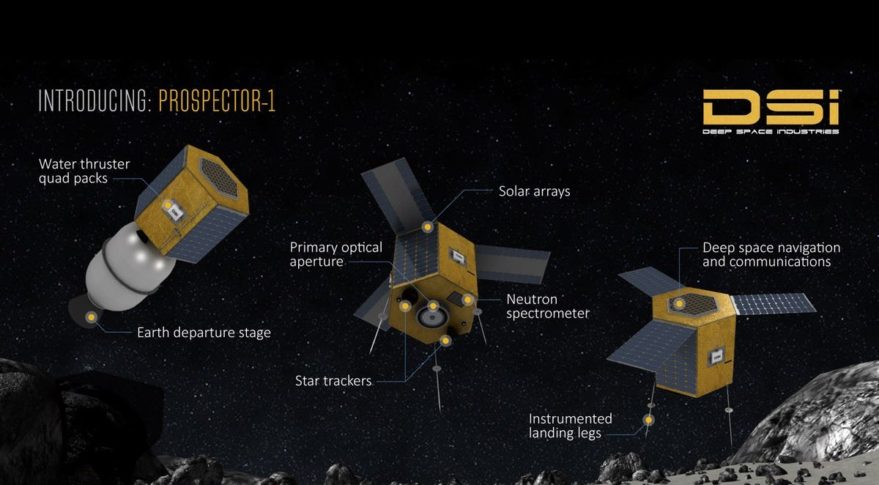Deep Space Industries Unveils First Asteroid Prospecting Spacecraft

Breaking space news, the latest updates on rocket launches, skywatching events and more!
You are now subscribed
Your newsletter sign-up was successful
Want to add more newsletters?

Delivered daily
Daily Newsletter
Breaking space news, the latest updates on rocket launches, skywatching events and more!

Once a month
Watch This Space
Sign up to our monthly entertainment newsletter to keep up with all our coverage of the latest sci-fi and space movies, tv shows, games and books.

Once a week
Night Sky This Week
Discover this week's must-see night sky events, moon phases, and stunning astrophotos. Sign up for our skywatching newsletter and explore the universe with us!

Twice a month
Strange New Words
Space.com's Sci-Fi Reader's Club. Read a sci-fi short story every month and join a virtual community of fellow science fiction fans!
LOGAN, Utah — Deep Space Industries plans to launch a small satellite by the end of the decade to survey a near Earth asteroid, the next major step in the company's long-term ambitions to mine asteroids for resources.
The company, based in Mountain View, California, announced its Prospector-1 mission Aug. 9. The 50-kilogram satellite is designed to visit an asteroid and look for deposits of water ice that could, in the future, be mined and used as propellant by other spacecraft.
"This is intended to be a very low cost first commercial mission to an asteroid," said Grant Bonin, chief engineer of Deep Space Industries, in a presentation about Prospector-1 Aug. 9 during the 30th Annual Conference on Small Satellites at Utah State University here. [Deep Space Industries' Asteroid-Mining Vision in Pictures]
The rationale for the mission, Bonin said, is based in the lack of knowledge about asteroids, what resources they offer, and how difficult it would be to extract those resources. "Pretty much every asteroid that we have studied extensively is fundamentally different," he said. Even asteroids with the same spectral type, as determined by groundbased telescopic observations, "can be completely different from a geophysical standpoint."
The Prospector-1 mission will launch into low Earth orbit as a secondary payload. It will then use its own chemical propulsion stage to leave Earth orbit, and onboard thrusters that use water as propellant to rendezvous and maintain position with the selected asteroid.
Once at the asteroid, Prospector-1 will use visible and mid-infrared cameras to map the surface to look for evidence of water in the form of salts and hydrated minerals. A neutron spectrometer will probe below the surface to measure hydrogen abundance linked to the presence of subsurface water ice.
Once the mapping is complete, Prospector-1 will attempt a landing at "a site of interest which think is extremely prospective" for detecting water, Bonin said. That landing, he said, would allow for additional science as well as "assert a commercial presence on an asteroid which can validate the policy regime for private companies to harvest space resources."
Breaking space news, the latest updates on rocket launches, skywatching events and more!
The company hasn't disclosed a specific date for the mission, which will depend on the asteroids they choose to visit. "We have mission concepts of operation that give us departure windows every year from 2019 to 2022," he said, that also minimize travel times to the asteroids. "We've got about half a dozen very, very attractive targets, which as you might imagine we're playing very close to our vest."
Prior to Prospector-1, Deep Space Industries plans to fly a technology demonstration mission, Prospector-X, in low Earth orbit. That spacecraft, being developed by the company in cooperation with the government of Luxembourg through its spaceresources.lu initiative, is planned for launch in 2017.
The company ultimately plans to develop follow-on missions that will extract water ice from asteroids, which the company can then sell to other customers for use as in-space propellant or other applications, reducing the cost of missions that would otherwise have to launch those resources from the Earth.
"Water is going to be a key enabler of the cislunar economy," said Bonin, who mentioned proposals like those offered by United Launch Alliance to both grow the number of people working in space and the economic value of space applications. "It's a grand vision, but it's predicated on the use of space resources."
This story was provided by SpaceNews, dedicated to covering all aspects of the space industry.

Jeff Foust is a Senior Staff Writer at SpaceNews, a space industry news magazine and website, where he writes about space policy, commercial spaceflight and other aerospace industry topics. Jeff has a Ph.D. in planetary sciences from the Massachusetts Institute of Technology and earned a bachelor's degree in geophysics and planetary science from the California Institute of Technology. You can see Jeff's latest projects by following him on Twitter.

